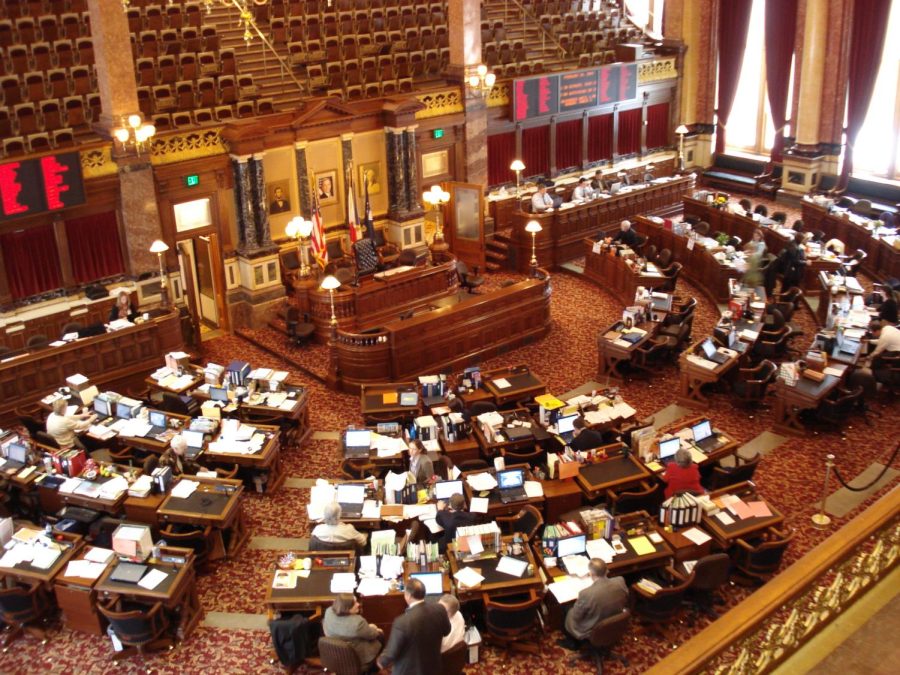Americans have spent years fighting for LGBTQ+ rights, and with every victory, they are one step closer to equality. Though America has taken many steps forward, much of that progress is now being threatened due to current proposed legislation. All the human rights progress the LGBTQ+ community has made for transgender rights was suddenly threatened when states began creating bills restricting transgender athletes from participating in sports.
Just recently, Iowa became one of eighteen states to put an anti-transgender athlete bill in place. House file 2416 has been passed by the House and has moved on to the Senate where it is only in need of Iowa Gov. Kim Reynolds’s signature, who made it clear that if she had the ability to sign a bill restricting transgender athletes, she would.
Essentially, this bill restricts students to only participate in athletic events with their biological sex and not the sexual orientation they identify with. Many feel such a bill is needed for the protection of cisgender girls in sports, but in reality, transgender girls need to be protected and provided with equal opportunities, too. The idea of this bill is not to promote fairness; instead, it is to further isolate those belonging to the transgender community.
Senior Beatrice Sears is a runner for PV’s cross country and track teams, and throughout her years, she has realized the team is more important than the sport itself. “Everyone has the same drive and commitment to a sport, no matter their gender. The bill banning transgender girls from competing in sports upsets me,” she explained. “It is depriving young girls of a chance to join a community and a team for a chance to discover a passion. Being on a team has been such an important part of high school for me. I could not imagine taking that opportunity away from transgender girls.”
It has become clear that this bill has become a way for people to discriminate against others based on how they identify, practically encouraging bullying. In addition, it has allowed transphobia to be acceptable and has increased the amount of derogatory names, incorrect pronoun usage and all forms of abuse to continue spreading.
The bill has furthered the growth of homophobia and transphobia in the world we live in and the presence of it within the United States government. Reynolds is not the only legislator that perpetuates transphobic legislation, let alone the only individual. With hateful comments being made on social media about athletes such as transgender female swimmer Lia Thomas, the truth of people’s real feelings comes into play. Some claim to support the LGBTQ+ community yet support this bill, which is hypocritical because one can not support a person as the gender they identify as, then strip them of their rights as soon as athletics come into play.
What many do not see is what is happening behind the scenes for many transgender athletes. According to NCAA, transgender female athletes are allowed to compete for their school as long as they are undergoing testosterone suppression medication. They are able to compete for the men’s team until they have done one year of suppression medication when they can officially compete for the women’s team. The goal of this policy was to not only improve fairness in competitions, but inclusion in the athletic community.
Senior Lila Teitle is a member of PV’s Unite Club, a group dedicated to bringing the high school community together through advocacy. “The bill itself supports students to spread hate and discriminate against transgender individuals. It is important that we work to combat the negative stigmas that it perpetuates and continue to encourage all students to express themselves,” she described.
Government officials and new legislation have made the world a harder place for those who have already experienced more hate than most will in their lifetime. Excluding members of the transgender community takes away the opportunities available for transgender youth and takes away the social aspects of sports with their peers. Many of these kids already experience mental health troubles and the restriction of activities only makes it worse. In a world that has worked hard to make mental health less stigmatized, it seems as though there is no trouble in worsening the pain of those affected.
High school is difficult enough, but throwing in this major hateful legislative divide makes it even more difficult.
Senior Taylor Buhr has participated in swimming for over 10 years and plans to continue in college. “I think by restricting transgender athletes to participate in sports decreases the already low amount of these athletes playing in general because they do not have a team to play for,” she said.
Those who make the argument that these individuals have chosen to transition to compete against women and win is extremely disrespectful to the community as a whole. They should be recognized for their strength and power for being who they are and not who society thinks they should be.
This bill does not only affect those who dedicate themselves to sports, but also those wanting to try something new. It changes the way high school athletes can compete, while also limiting the activities transgender students can be a part of. Society has evolved to be more accepting, but this bill would be the opposite of moving forward, essentially moving the rights of the transgender community back to square one. It does not negate all the progress in LGBTQ+ rights, but it does further separate a very significant part of the population from feeling belonging.









